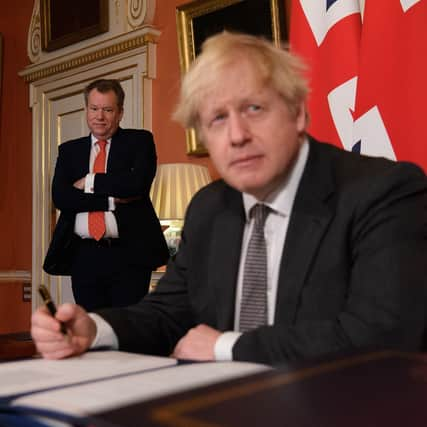Henry Hill: Boris Johnson for all his faults is now strongly defending Northern Ireland-Great Britain trade


Having used Northern Ireland as a stick with which to beat Theresa May, he then seemingly consigned the Province to become an economic satrapy of the European Union for the sake of ‘getting Brexit done’.
Somewhat to my surprise, there were sincere unionists inside government prepared to offer a limited defence of the prime minister’s actions.
Advertisement
Hide AdAdvertisement
Hide AdTo hear them tell it, the capitulation over an Irish Sea border was essentially forced on the government by Parliament.


Once the ‘Benn Act’ was passed, and the threat of leaving without a deal taken off the table, Johnson had no leverage with which to secure further concessions on Northern Ireland. By the time he won his majority in December 2019, it was on a promise to deliver a signed-and-sealed deal.
Ulster was not forgotten, I was assured. The conclusion of the Withdrawal Agreement made the job of securing its position in the United Kingdom harder, but it would be done.
I was deeply sceptical. The prime minister is not one of that small cadre of mainland politicians with a special interest in Northern Ireland. Nor, as he allowed his Union Unit to dissolve amid personal infighting amongst his aides, did he seem to have a particularly solid grasp on the broader constitutional question.
Advertisement
Hide AdAdvertisement
Hide AdYet for all the disappointments and betrayals, I suggest that the past 18 months should give unionists on both sides of the water some cause for optimism about the government’s determination to secure meaningful changes to the protocol.
Whilst the mainland portion of the Union strategy since the departure of Luke Graham and Oliver Lewis from Downing Street has been a shambles, the same cannot be said of the Northern Irish section.
David Frost and Brandon Lewis might not (yet) have triggered Article 16, but they have nonetheless taken a strong and consistent line on Ulster’s economic connections to Great Britain. One government source told me the red line was disruption of food supply chains from east to west. Thus the repeated extension of the ‘grace periods’.
This slow approach is important, because a big part of any future triggering of Article 16 will be optics. The idea in London seems to be to show that it has given Brussels plenty of opportunities to find a workaround before pulling the pin on that particular grenade.
Advertisement
Hide AdAdvertisement
Hide AdAt this point, critics of the government usually start crying “but you signed it!”, and demanding that they honour the Withdrawal Agreement in full.
However, this cuts both ways. Article 16 is part of the Withdrawal Agreement – it can scarcely breach a treaty to activate a provision of that treaty. More importantly, the text of Article 16 explicitly lists “diversion of trade” as a legitimate grounds for triggering ‘unilateral safeguards’.
And what else is forcing supermarkets to drop mainland suppliers and find EU replacements than diversion of trade?
Of course, this strategy depends on the continuing political support of the prime minister, and unionists can be forgiven for doubting that he will come through for the Union when the crunch comes. Plenty of pro-UK Conservatives share those concerns.
Advertisement
Hide AdAdvertisement
Hide AdBut there is no denying that Johnson has toughened the government’s posture on this question, most decisively when he appointed Frost to replace the conciliatory Michael Gove.
With a huge majority and the small matter of a global pandemic to deal with, there was little domestic pressure on him to do so.
Likewise, the new constitutional strategy built into the UK Internal Market Act and upcoming Subsidy Control Bill envision the Government playing a fuller role in every corner of the country, including Ulster.
And whilst I can’t speak for Downing Street, there is today noticeable more awareness of Northern Ireland inside the Conservative Party.
Advertisement
Hide AdAdvertisement
Hide AdPro-UK activists increasingly expect Conservative Campaign Headquarters (CCHQ) to be as ready to fight a future border poll as a second independence referendum in Scotland.
There is still a long way to go, and we cannot afford to be complacent. The battle over the protocol has highlighted just how far Northern Ireland’s position in the UK has been degraded, and even delivering meaningful changes to the Withdrawal Agreement won’t fix that.
But that is no excuse to indulge in fatalistic pessimism, unionism’s most debilitating vice.
Not when London is showing the first signs in a long time of taking a pro-active, pro-Union approach to the whole country.
Advertisement
Hide AdAdvertisement
Hide Ad• Henry Hill is News Editor at ConservativeHome and tweets at @HCH_Hill
——— ———
A message from the Editor:
Thank you for reading this story on our website. While I have your attention, I also have an important request to make of you.
With the coronavirus lockdown having a major impact on many of our advertisers — and consequently the revenue we receive — we are more reliant than ever on you taking out a digital subscription.
Subscribe to newsletter.co.uk and enjoy unlimited access to the best Northern Ireland and UK news and information online and on our app. With a digital subscription, you can read more than 5 articles, see fewer ads, enjoy faster load times, and get access to exclusive newsletters and content. Visit https://www.newsletter.co.uk/subscriptions now to sign up.
Advertisement
Hide AdAdvertisement
Hide AdOur journalism costs money and we rely on advertising, print and digital revenues to help to support them. By supporting us, we are able to support you in providing trusted, fact-checked content for this website.
Ben Lowry
Acting Editor